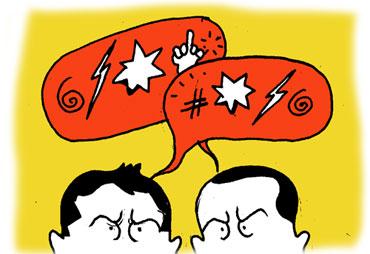 | « Back to article | Print this article |
5 ways to deal with an unpleasant colleague
Instead of mulling over their behaviour, here's what what you can do to overcome the situation.
We all have that one unpleasant colleague whom we love to hate (secretly).
You cannot zap the person away, like in magic stories or comic books.
This is the proverbial colleague who makes your office life miserable and is like a burr that refuses to be brushed off!
The main problem is that even the best training schools do not discuss this problem, though it is probably the most common and universal, and is present around the world.
It is something that is brushed under the carpet and everybody pretends the problem does not exist even though it is possibly the main (unofficial) reason why people play possum, and fall sick and waste work hours the most.
Possibly it is one of the biggest reasons behind drop in work performance and efficiency.
The other problem is that institutions may covertly encourage internecine discord simply because the institution may believe that a bit of competition adds to edginess and overall efficiency.
In such an atmosphere, taking the matter up, with those who are higher up, will probably cause more damage and at best, not yield any relief. You are often left to fend for yourself from such attacks.
1. Do not 'carry' the colleague home
Often this is done simply unconsciously. But often you may end up continuously mulling and worrying about the words or acts of your nemesis at work, and continue being in a dark mood even when you reach home.
Often you may not even be aware you are doing this. But this sort of negative static in your brain is likely to make you sick soon, if it is not already doing it.
Plus, you will unconsciously burden your entire family or those who live with you (if you are living as paying guest even) with dark recollections of your colleague.
Unless the discussion is heading towards a solution or is seeking an immediate one, this sort of unconscious unburdening is going to make the others yawn or turn away from you.
In this fashion, your colleague would have managed to ruin even your home life.
If you need to sound off, fix a few minutes, with somebody close to you, but stop after a point and shift your mind deliberately towards more positive things -- a hobby you can reconnect at home, a book you want to read, the play you wanted to catch, or a TV show you relate to you.
Leave the colleague back at workplace.
This is the first step to ensure that you are not too deeply affected by this person.
The author Shameem Akthar is a yogacharya trained with the Sivananda Yoga Vedanta Center.
Please click NEXT to continue reading...
2. Let the gift stay with the giver
If the behaviour of a person is affecting your work and its efficiency, you have a right to rectify the situation.
Sometimes this may not be possible if the other person is in an influential position, or a higher up, or even closer to a higher up.
To rectify the situation would mean to discuss it with the person in charge to see if something may be done if there a colleague's behaviour is interfering with your work.
If this presented well enough, often a sensitive boss will help out, by sorting things out. That is also part of their responsibilities.
However, if the situation has hit a cul de sac, the best retort to the barbs coming your way is to ignore them.
As the Buddha says, 'If a gift is given to someone and the person does not accept it, the gift remains with the giver.'
He was referring to such situations, where if you act indifferent, the other person may actually back off.
A lot of eastern martial arts are based on such a philosophy. Which explains why management gurus borrow from martial arts to be more efficient and Zen like at work.
Please click NEXT to continue reading...
3. Laughter is the key
In one of the Harry Potter films, the kids are taught a powerful lesson in dealing with dark forces: by just seeing them as funny and laughing them to nothingness.
Perhaps that is not just for the kids.
If you mull and fume and fret, you are likely not to do much to rectify the situation.
If you see the humour in the situation, or something funny, even though it may take a long while and be rather difficult initially, it will turn the situation around.
In alternative therapies there is a belief that much of what happens to you in such casual situations can be reversed just by how you think.
Humour alters perspective, makes the villain a comic and rather harmless.
The situation will not appear to be so grim, and the colleague less intimidating.
If you did not have to brace yourself psychologically for every encounter you have with an unpleasant colleague you will find, as a nice surprise, and this often a given, the person backs off, simply because they realise that they are not affecting you as before.
Please click NEXT to continue reading...
4. Don't be a victim
Often a colleague's negativity may have a reason: just envy at how you work, or who you are.
If you allow yourself to become victimised, this works very conveniently into the person's subconscious need to be unpleasant to you -- you will be leaking energy by the bucketloads.
This would be just the perfect result for such unprovoked attack.
Often, a negative person at work behaves in a certain fashion without any apparent reason and most of us hardworking types may exhaust our reasoning and energy trying to decipher such behaviour.
Actually, the hidden reason behind any negative behaviour is to exhaust the target with such meaningless obsession.
So, there is no call to drain our energy trying to understand why a person behaves in an unpleasant manner.
To do so would make you less efficient, and possibly draw your mind from your work, which is what the person intends.
If you are a regular mediator, you become aware of such subtle undercurrents all around and choose which one you want to be dipped in and which one you wish to avoid.
This calls for some determined observation of your own mind's obsession with the other person, and ensure that you do not direct your energy towards that person.
In the long run, if that sort of rumination continues -- over hurts and injuries -- then, you will simply feel sick, exhausted and less motivated at work. All of which is what the energy vampire seeks!
Please click NEXT to continue reading...
5. Play positive
Once this is established, you can rein in the mind's constant movement towards the colleague, and shift it deliberately towards positive things at work.
One way to do it forcefully and as a matter of conscious training is that every time you think of the colleague, you pretend to switch the image off (as with a remote control) and switch on another channel of your mind and run things through that are pleasant at work -- a work friend you like to catch up at tea break, for instance.
This is part of the tricks used in neurolinguistic programming (the buzz word in mind control, management techniques and goal-setting), to be able to be more efficient, positive and effective.




